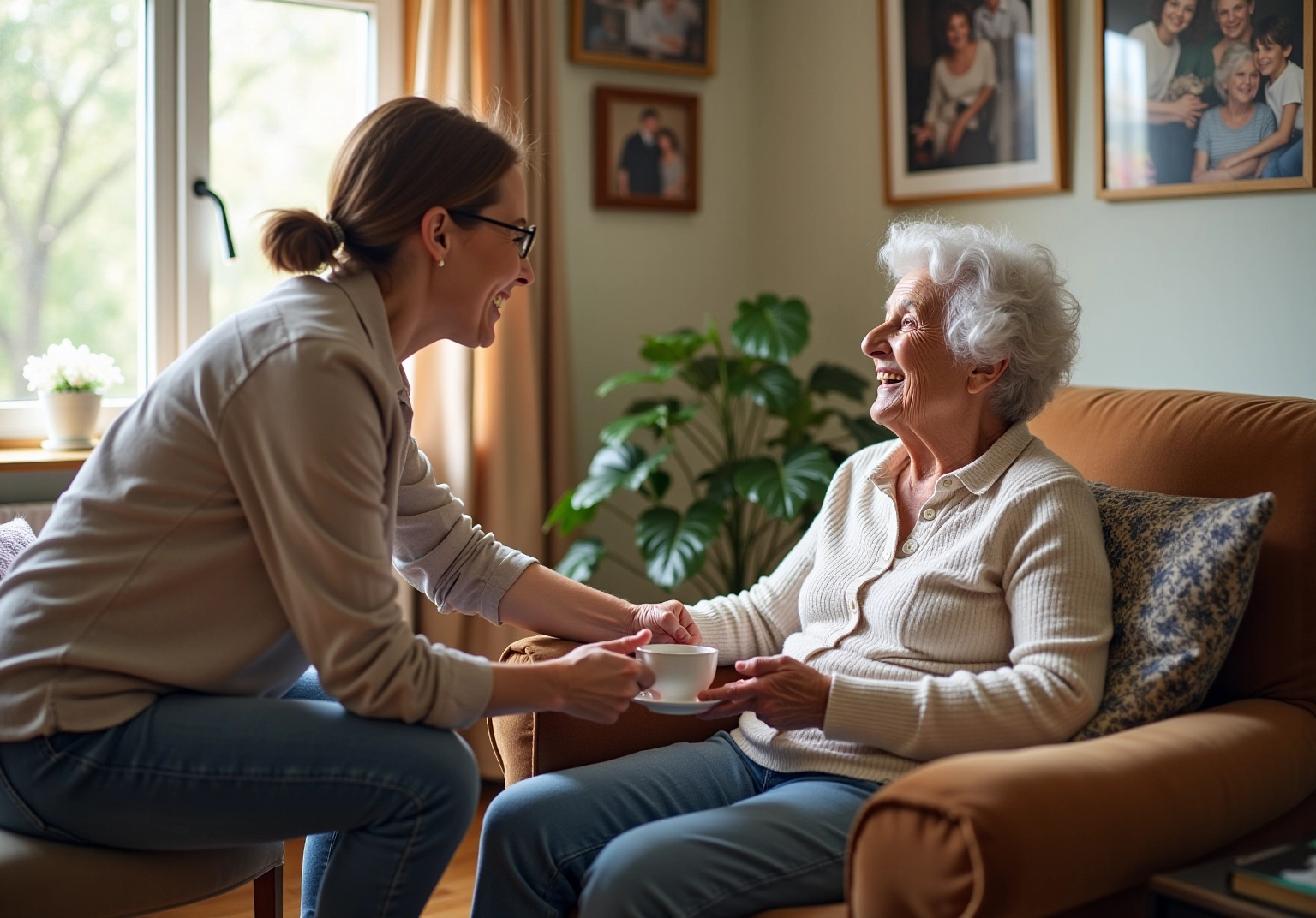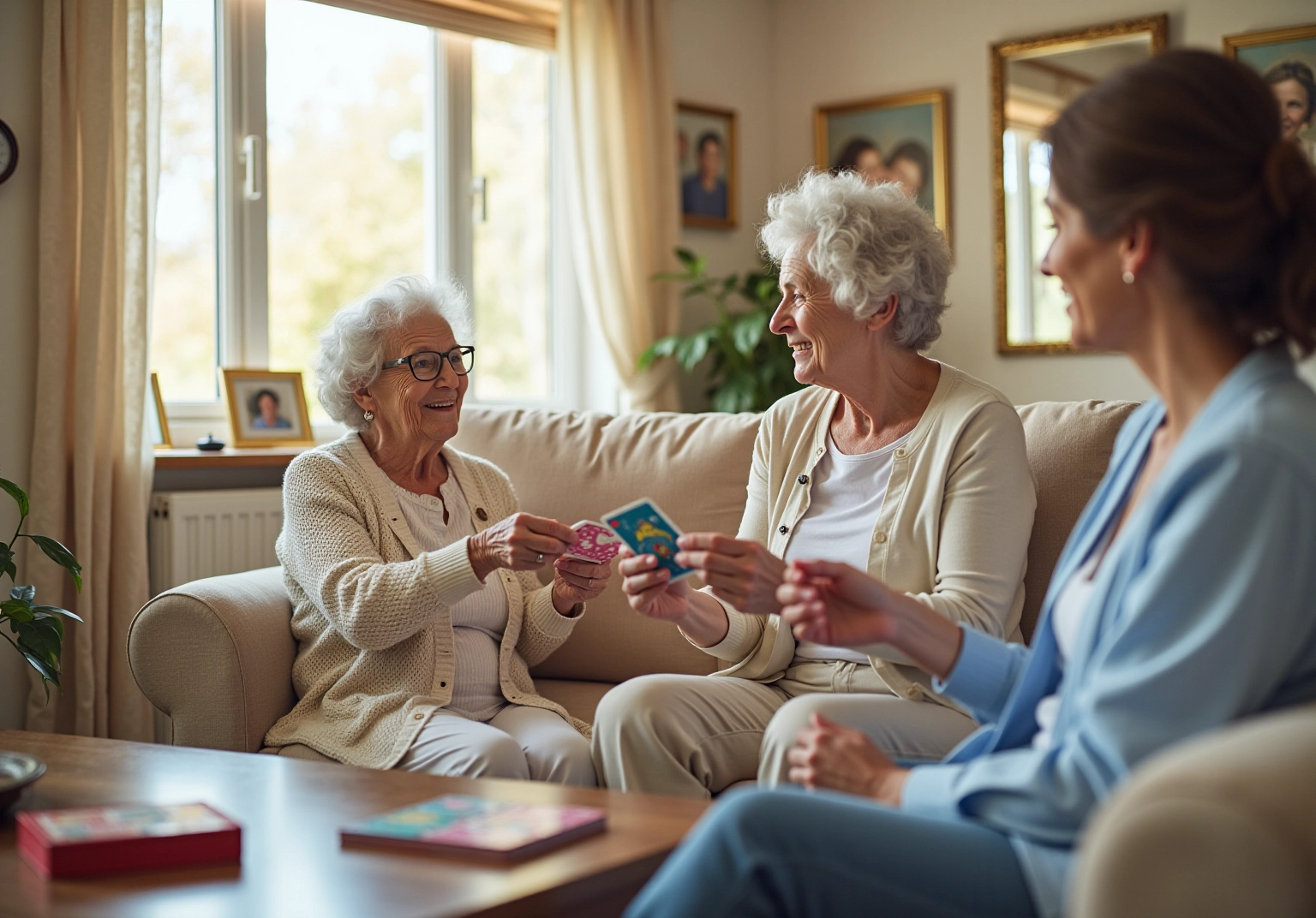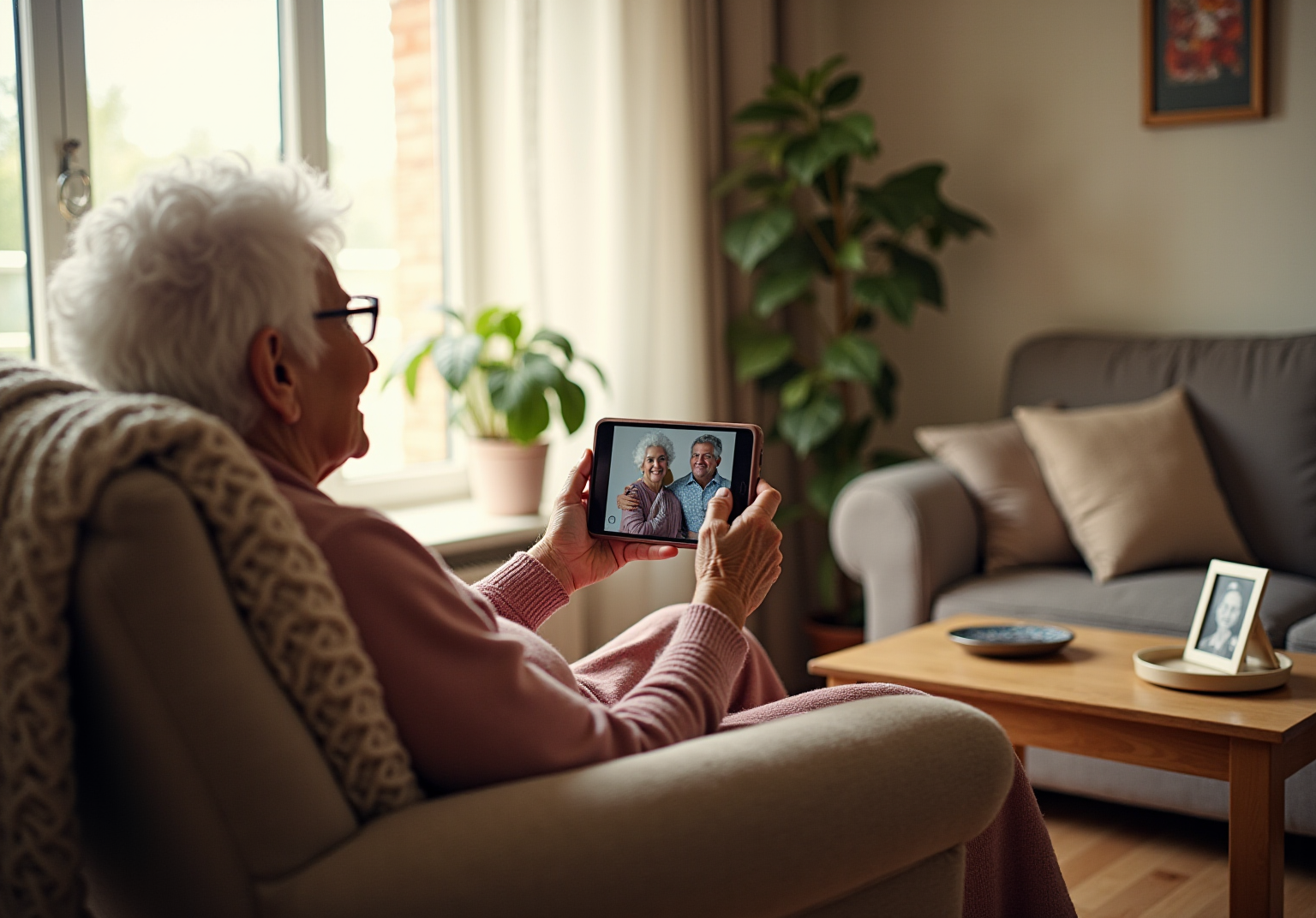Overview
The essential qualities of a private duty caregiver—compassion, reliability, effective communication, adaptability, patience, professionalism, experience, companionship, problem-solving skills, and physical fitness—are vital for nurturing the emotional and physical well-being of clients. These attributes not only foster trust but also improve health outcomes, creating a supportive environment that leads to a more positive caregiving experience.
Imagine the comfort of knowing that your caregiver embodies these qualities. When caregivers approach their roles with empathy and dedication, clients feel valued and understood. This connection is essential for enhancing overall well-being and ensuring that each individual receives the care they deserve.
As you consider the importance of these traits, remember that we’re here for you. The right caregiver can make a world of difference, providing not just assistance but also companionship and understanding. Your comfort is our priority, and we strive to create a nurturing atmosphere where you or your loved ones can thrive.
Introduction
In the realm of private duty caregiving, compassion stands as a fundamental pillar that profoundly influences the quality of care provided to clients. As caregivers navigate the complexities of their roles, the ability to empathize and connect with those they serve becomes critical in fostering emotional well-being and improving health outcomes. With many caregivers experiencing psychological distress, the need for compassionate support is more urgent than ever.
This article explores the essential qualities that define effective caregiving. These include:
- Reliability
- Effective communication
- Adaptability
- Patience
- Professionalism
- Experience
- Companionship
- Problem-solving skills
- Physical fitness
Each quality plays a vital role in creating a nurturing environment that not only enhances the lives of seniors but also uplifts the caregivers themselves.
By prioritizing these qualities, we can pave the way for a more compassionate, effective, and fulfilling caregiving experience for everyone involved. Remember, your comfort is our priority, and we’re here for you every step of the way.
Compassion: The Heart of Private Duty Caregiving
Compassion serves as the cornerstone of effective support, embodying the ability to understand and empathize with the emotions and needs of individuals. At Best Care Nurses Registry, we recognize that private duty caregivers who exemplify compassion can profoundly enhance the emotional well-being of those they assist, leading to improved health outcomes. Research indicates that approximately 70% of individuals supporting those with dementia experience varying levels of psychological distress, underscoring the critical need for emotional support and empathy in these roles to mitigate burnout and enhance satisfaction derived from compassion.
Our approach to personalized home health services follows a simple three-step process to ensure that every client receives the empathetic assistance they deserve.
- Step 1 involves reaching out to our friendly staff at (888) 203-2529 to discuss your needs and address any questions you may have.
- Step 2 includes a conversation about your situation with you or your loved one, along with obtaining a care plan from your doctor that perfectly aligns with your needs.
- Finally, in Step 3, we connect you with a private duty caregiver who offers compassionate support of your choice, ensuring a perfect match for your family.
A private duty caregiver, who listens attentively and responds with kindness, can significantly ease feelings of loneliness and anxiety in seniors, nurturing a sense of value and understanding. This emotional connection is essential for fostering a supportive environment where clients feel safe and cared for. Studies have shown that seniors receiving empathetic support often enjoy better emotional well-being, which can lead to improved physical health outcomes. For instance, individuals who engage in meaningful interactions can help alleviate the psychological distress associated with chronic illnesses, enhancing the overall quality of life for their clients.
The importance of compassion in providing support is further emphasized by expert opinions, which highlight that a thoughtful and intentional response to understanding a person’s needs can alleviate their suffering through relational understanding and action. By prioritizing compassion, providers not only elevate their clients’ emotional well-being but also contribute to a more positive support experience, ultimately benefiting both parties involved. Additionally, it is vital to acknowledge that family providers often overlook the influence of public policy on their daily lives, which highlights the systemic challenges they encounter and the necessity for compassion and support in their roles. We are also proud to offer pet-friendly services, ensuring that your loved ones can enjoy the companionship of their furry friends while receiving care.
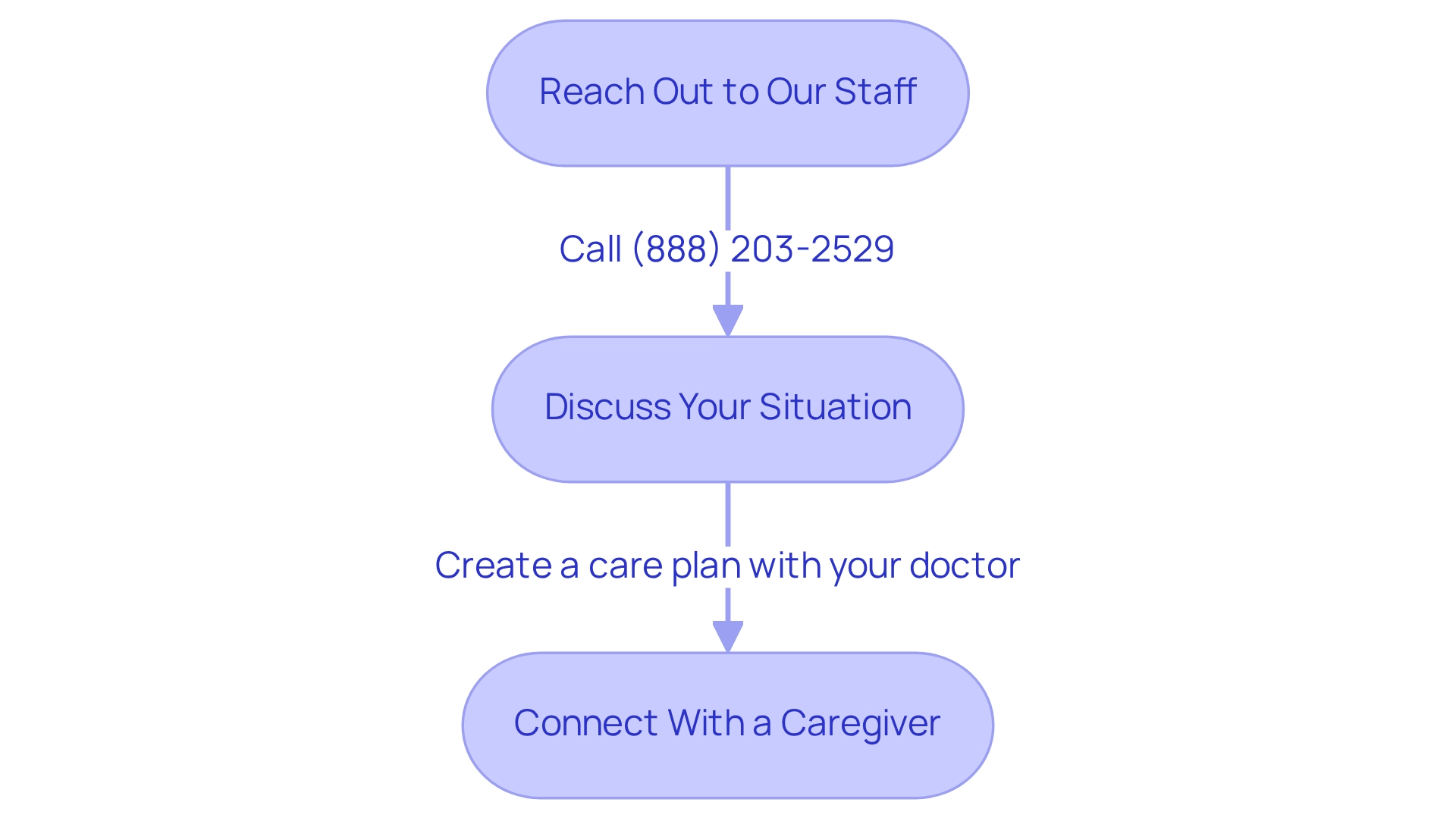
Reliability: Ensuring Consistent Support for Clients
Reliability in caregiving is essential for a private duty caregiver, as it involves the consistent presence and fulfillment of commitments by those providing care. When private duty caregivers follow schedules and arrive on time, it not only reassures clients but also their families, establishing a foundation of trust. For instance, a support worker who consistently arrives punctually for planned visits helps create a routine that seniors can depend on, which is vital for their well-being. This consistency nurtures a sense of security, allowing individuals to feel more at ease and supported in their daily lives.
Statistics emphasize the significance of reliability in home health services; research indicates that individuals who receive regular support from their providers report higher satisfaction levels. In fact, a strong correlation exists between caregiver reliability and overall patient happiness, with dependable caregivers contributing to improved health outcomes for seniors. Expert insights further highlight that punctuality is not just a matter of professionalism but a crucial element of effective support, as it directly affects the emotional and psychological stability of clients.
Moreover, the challenges faced by seniors without CNA/HHA services underline the critical need for dependable assistance. Health declines, poor nutrition, hygiene issues, and increased social isolation can all stem from a lack of professional support. By ensuring that private duty caregivers are consistently present and engaged, agencies can significantly enhance the quality of support provided to seniors, ultimately leading to a more positive assistance experience. As Margaret S. wisely noted, “Take comfort in knowing you don’t need to fill up the silence to have a visit be meaningful,” illustrating the emotional richness that reliable caregiving brings to clients’ lives. This reliability not only enhances the quality of life for seniors but also provides peace of mind for their families, knowing that their loved ones are receiving the care they need.
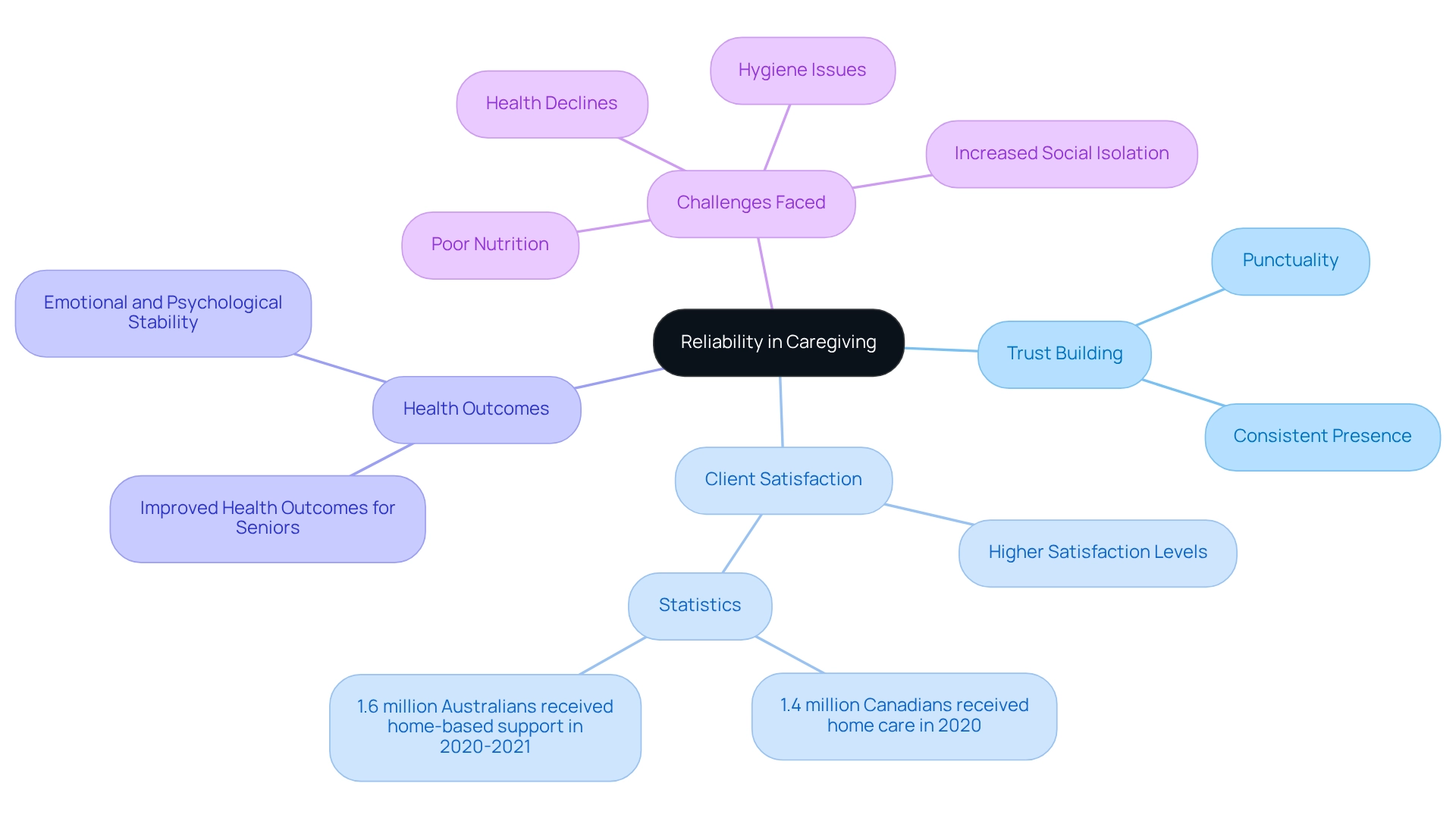
Effective Communication: Bridging Gaps in Care
Effective communication is a crucial skill for a private duty caregiver, encompassing verbal exchanges, active listening, and non-verbal cues. Support providers must express assistance plans clearly, ensuring individuals comprehend their requirements and preferences for a private duty caregiver. For instance, when a private duty caregiver takes the time to explain medication schedules or dietary restrictions, they empower clients to take charge of their health, which is essential for promoting independence. Did you know that 82% of patients prioritize high-quality customer support when choosing treatment? This statistic emphasizes the importance of efficient communication in home health services.
At Best Care Nurses Registry, we understand that emotional support is vital for families. Our private duty caregivers are not only skilled but also thoroughly vetted to ensure they offer compassionate assistance. This allows families to breathe easier, knowing their loved ones are safe and happy at home. In addition, open channels of communication encourage individuals to express their concerns, resulting in more tailored and efficient support provided by a private duty caregiver. The typical age of those providing care is 50 years, often contributing a wealth of experience. However, for a private duty caregiver, it is essential to address their communication needs to foster a supportive environment. Remember, the primary guideline for a private duty caregiver in providing support is to prioritize one’s own well-being, as sustaining health allows them to interact effectively and deliver quality support. Effective communication techniques, such as active listening and empathy, not only boost user satisfaction but also enhance health outcomes. For example, a private duty caregiver who actively engages with patients can better understand their preferences, leading to customized support that addresses personal needs. Furthermore, the individualized planning process at Best Care Nurses Registry guarantees that each plan is tailored to meet the specific requirements of clients, especially those who require a private duty caregiver, reducing anxiety for family supporters. A recent case study on patient experiences with scheduling appointments reveals that patients often encounter inefficiencies, spending an average of 8 minutes on the phone and frequently being transferred. This underscores the need for streamlined communication processes in healthcare settings. By prioritizing communication, providers can close gaps in support, ultimately improving the overall patient experience.
We’re here for you. Call (888) 203-2529 to discuss your needs and explore personalized assistance solutions with Best Care Nurses Registry.
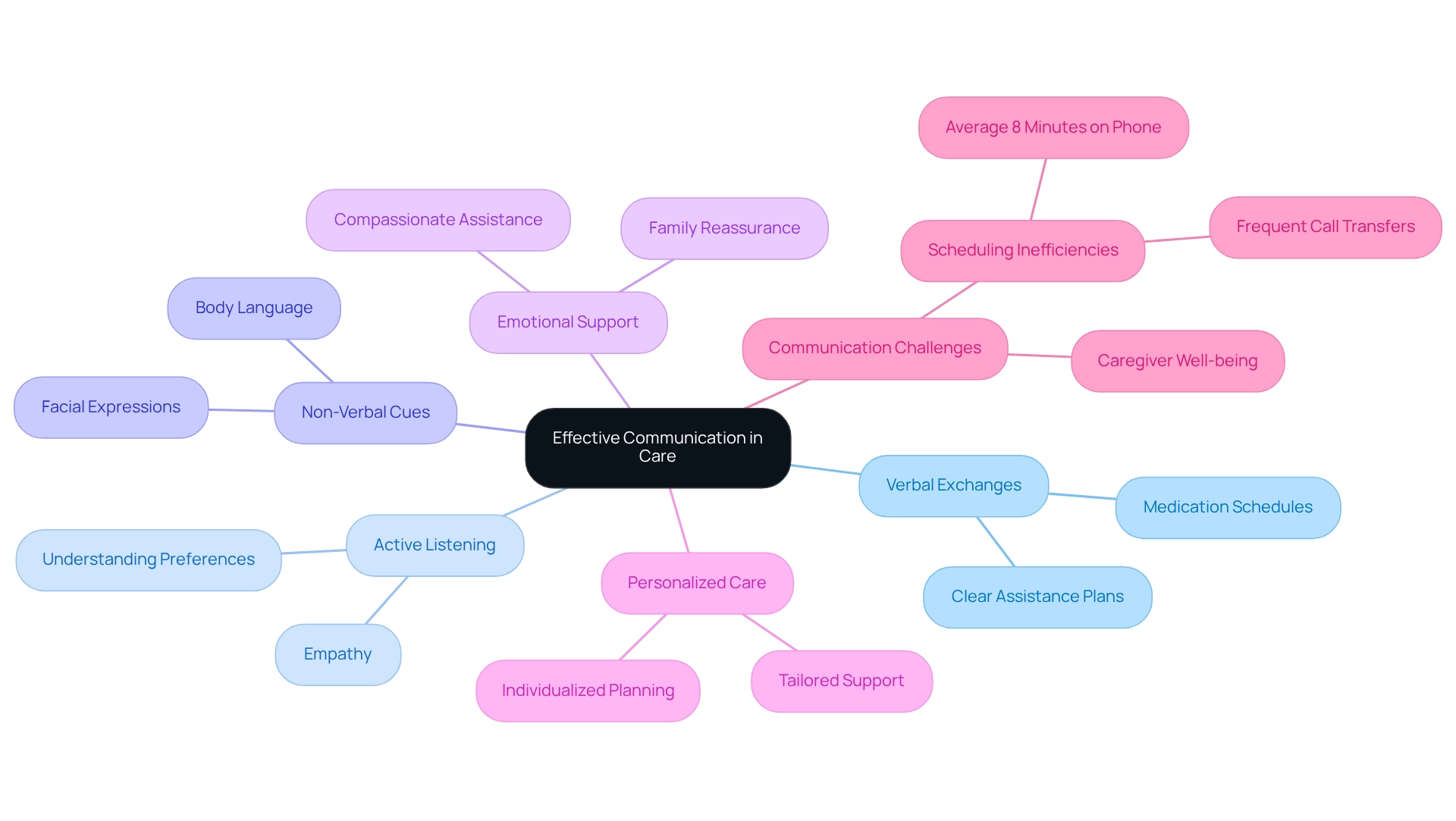
Adaptability: Tailoring Care to Individual Needs
Flexibility is an essential trait for a private duty caregiver, allowing them to adjust assistance strategies in response to the evolving needs of the individuals they serve. Imagine if an individual’s health condition changes or they express new preferences; the ability of a private duty caregiver to modify daily routines becomes crucial. This adaptability not only enhances the quality of support from a private duty caregiver but also empowers individuals, fostering a sense of control over their lives.
Private duty caregivers who can pivot effectively are better positioned to deliver personalized care that aligns with the unique needs of each individual. Research highlights that flexible care plans significantly impact senior health, with private duty caregivers’ adaptable practices linked to higher client satisfaction rates. The absence of CNA/HHA support services can lead to serious issues such as health declines, poor nutrition, hygiene problems, and increased risks of falls. These challenges underscore the importance of recognizing when assistance is needed.
By being adaptable, a private duty caregiver can assist families in identifying these signs early, allowing for timely interventions that enhance the overall well-being of seniors. Furthermore, data reveals that nearly half of those providing support earn under $50,000 annually, often facing financial struggles while delivering essential assistance. This context reinforces the necessity for private duty caregivers to be adaptable, not only in their approach to support but also in navigating the complexities of their roles.
Additionally, the emotional support and companionship provided by caregivers can alleviate feelings of isolation and sadness, further enhancing the quality of life for seniors. Ultimately, the ability to adapt is not just a skill; it is a cornerstone of high-quality caregiving that a private duty caregiver provides, significantly improving the well-being of seniors. If you or someone dear to you requires personalized support, consider reaching out to Best Care Nurses Registry to discover how our compassionate staff can assist you.
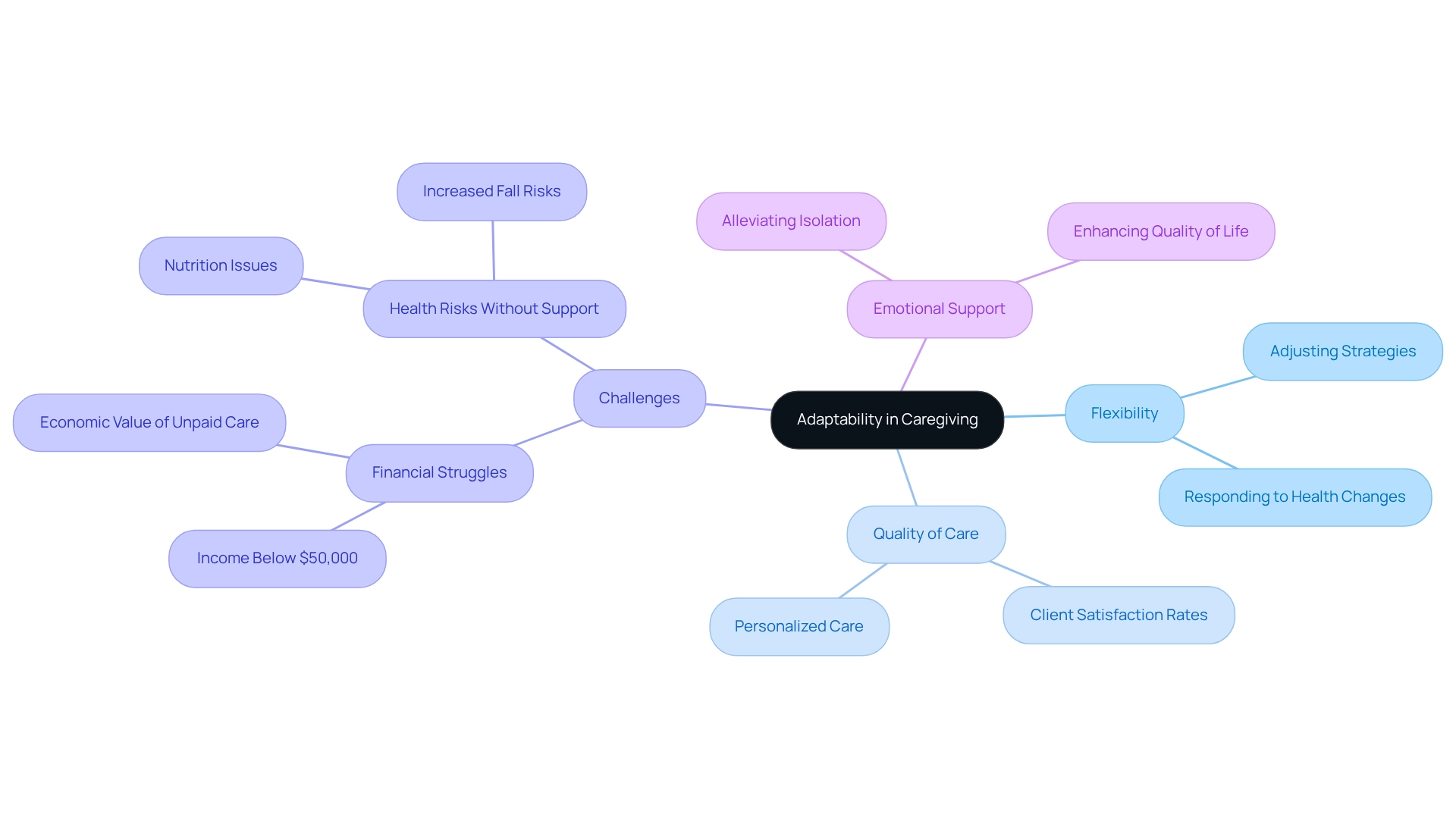
Patience: Navigating Challenges with Grace
Patience is a vital quality for caregivers, particularly when supporting seniors who may face cognitive impairments or physical limitations. Certified Nursing Assistants (CNAs) and Home Health Aides (HHAs) play a crucial role in this context, providing assistance with daily living activities such as bathing, grooming, meal preparation, and medication management. Their consistent contact with patients is essential for keeping family members informed about their loved one’s condition. Caregivers often encounter situations that require a calm and composed demeanor, especially when individuals struggle to express their needs or feel frustrated by their limitations. By exhibiting patience, caregivers not only alleviate anxiety for these individuals but also cultivate a more positive caregiving atmosphere. For instance, when caregivers take the time to assist individuals with tasks—regardless of how long it may take—they significantly enhance their sense of dignity and self-esteem.
Research shows that those who demonstrate patience can effectively reduce anxiety levels in their clients, leading to improved overall well-being. In fact, a significant percentage of caregivers report that receiving support and information from health professionals positively impacts their ability to manage stress and challenges. This highlights the importance of patience not only in personal interactions but also within the broader context of support networks for caregivers. Notably, the typical family provider is a 49-year-old woman, underscoring the unique challenges and experiences faced by those in this role.
Real-world examples illustrate how patience can transform challenging situations. For instance, those who patiently navigate moments of confusion or frustration with seniors often find that these interactions strengthen their relationships, fostering trust and comfort. Experts emphasize that creating a supportive atmosphere for caregivers, including access to resources and peer networks, can enhance their ability to provide compassionate assistance. As Marcela D. Blinka from the Center on Aging and Health notes, “There needs to be some kind of support network for those providing care to offer advice to one another and become acquainted.” Ultimately, patience is not just a quality; it is an essential element that enriches the support experience for both providers and clients alike. Moreover, recognizing the signs that indicate the need for caregiver services—such as challenges with personal hygiene, dressing, or managing medications—can help families ensure their loved ones receive the necessary support, further emphasizing the importance of patience in the caregiving process. Additionally, CNAs and HHAs offer hourly services without a minimum requirement, making it easier for families to access the assistance they need.
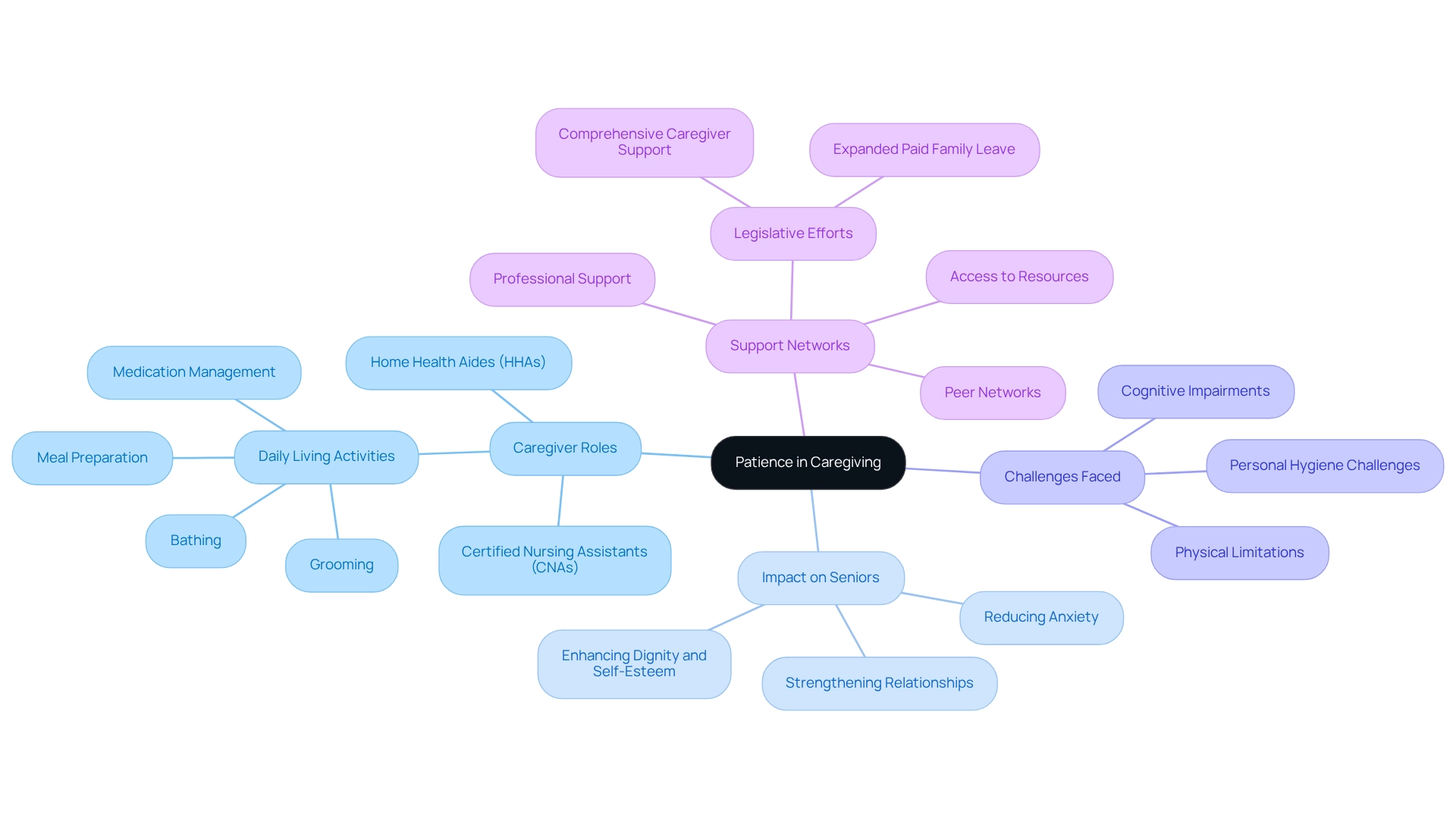
Professionalism: Upholding Standards in Care
Professionalism in caregiving is essential, encompassing ethical behavior, respect for individual privacy, and strict adherence to treatment protocols. Caregivers are expected to embody a professional demeanor characterized by punctuality, appropriate attire, and preparedness for their responsibilities. For instance, a provider who reliably arrives on time, dressed suitably, and ready to engage with their charge demonstrates a commitment to professionalism that nurtures trust and respect. This level of professionalism not only strengthens the caregiver-client relationship but also sets a standard for the quality of care delivered.
Research indicates that professionalism significantly influences trust among those receiving care. Providers who display ethical conduct and dependability are more likely to foster strong, trusting relationships with those they assist. In fact, statistics reveal that 22% of family supporters express a need for help in communicating with healthcare providers, underscoring the vital role that professional supporters play in bridging communication gaps. Professionalism encourages effective communication, ensuring that patients’ needs are clearly conveyed to healthcare providers. Furthermore, a study found that 17% of caregivers reported a decline in their overall health due to their responsibilities, while those who uphold high standards of professionalism experience less stress and improved health outcomes, highlighting the mutual benefits of professionalism in caregiving.
Instances of ethical behavior in caregiving include preserving confidentiality, securing informed consent, and advocating for the best interests of the individual. These practices not only enhance the provider’s credibility but also reassure patients and their families that they are receiving compassionate and skilled care. As Dr. Stephen Hoag poignantly notes, “No matter what the relationship was between the parent and child—whatever it was—this is going to be extremely challenging because it is not logical. There’s no way to deal with it rationally or directly.” This statement underscores the emotional challenges faced by caregivers, reinforcing the importance of professionalism in navigating these complexities. Ultimately, professionalism in caregiving transcends mere standards; it is about cultivating lasting relationships grounded in trust, respect, and a shared commitment to the client’s well-being.
Moreover, the financial strain on caregivers is noteworthy, with the average family supporter for someone aged 50 or older spending $5,531 annually on out-of-pocket support costs. This reality further emphasizes the necessity for a private duty caregiver to provide professional assistance in this demanding role. We are here for you, ensuring that your comfort and the well-being of your loved ones are our top priorities.
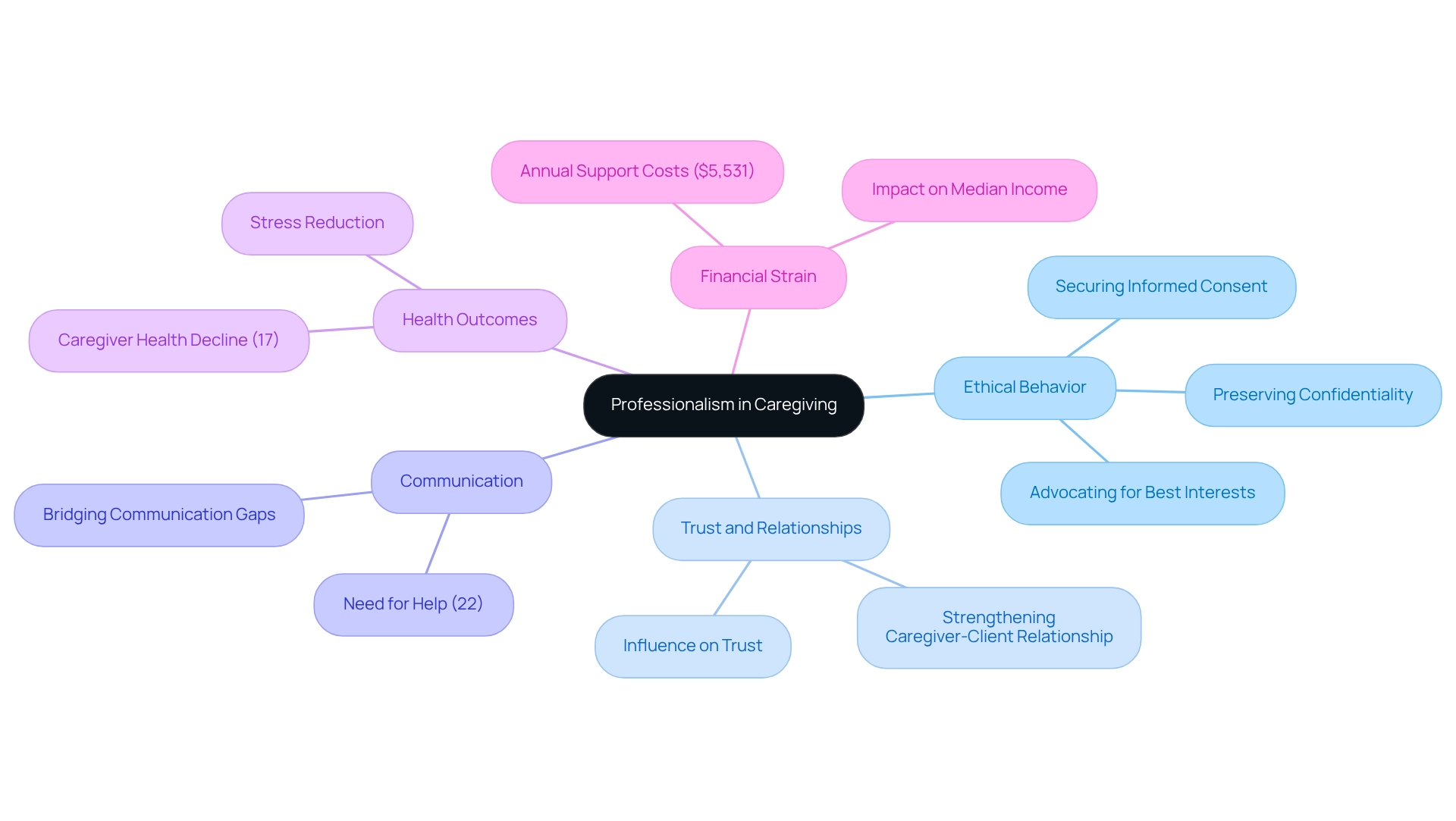
Experience: Leveraging Knowledge for Better Care
Experience is an invaluable asset for a private duty caregiver, enabling them to draw from past encounters to enhance their current practices. Seasoned private duty caregivers have a heightened ability to recognize signs of distress or changes in a person’s condition, enabling swift and effective responses. For instance, a provider with extensive experience in caring for individuals with dementia often finds themselves more adept at managing challenging behaviors and implementing appropriate interventions. This depth of experience not only elevates the quality of care provided by a private duty caregiver but also fosters trust and confidence among patients and their families.
Statistics show that 32% of caregivers rely on paid help, underscoring the essential role of skilled professionals in the caregiving landscape. Experienced providers, including a private duty caregiver, are particularly valuable; their understanding of various health situations equips them to tackle challenges efficiently, ensuring that individuals receive personalized support. Research indicates that private duty caregivers with experience significantly improve patient outcomes, especially in managing complex health conditions. Without the support of CNA/HHA services, seniors face numerous risks—such as health decline, poor nutrition, hygiene issues, and increased social isolation—all of which can severely impact their quality of life.
Expert opinions consistently affirm the importance of experience in caregiving. Support providers often share that identifying client needs becomes more instinctive over time, which allows a private duty caregiver to provide more tailored assistance. The National Alliance for Caregiving and AARP found that 66% of individuals providing support feel it is very easy or somewhat easy to coordinate assistance recommended by health professionals and service providers. This highlights how seasoned private duty caregivers improve communication and the coordination of services.
Moreover, the case study titled “Health Information Seeking Behavior of Caregivers” illustrates that experienced caregivers are more likely to proactively seek health information online, reflecting their dedication to informed care. This proactive approach is crucial, as it not only enriches the support experience but also alleviates the emotional burden on families. In essence, the benefits of experience in caregiving are profound, leading to better health outcomes and an improved quality of life for clients. Additionally, considering that the average family caregiver for someone over 50 spends $5,531 annually on out-of-pocket support costs, investing in skilled caregivers can be a meaningful step towards ensuring quality care.
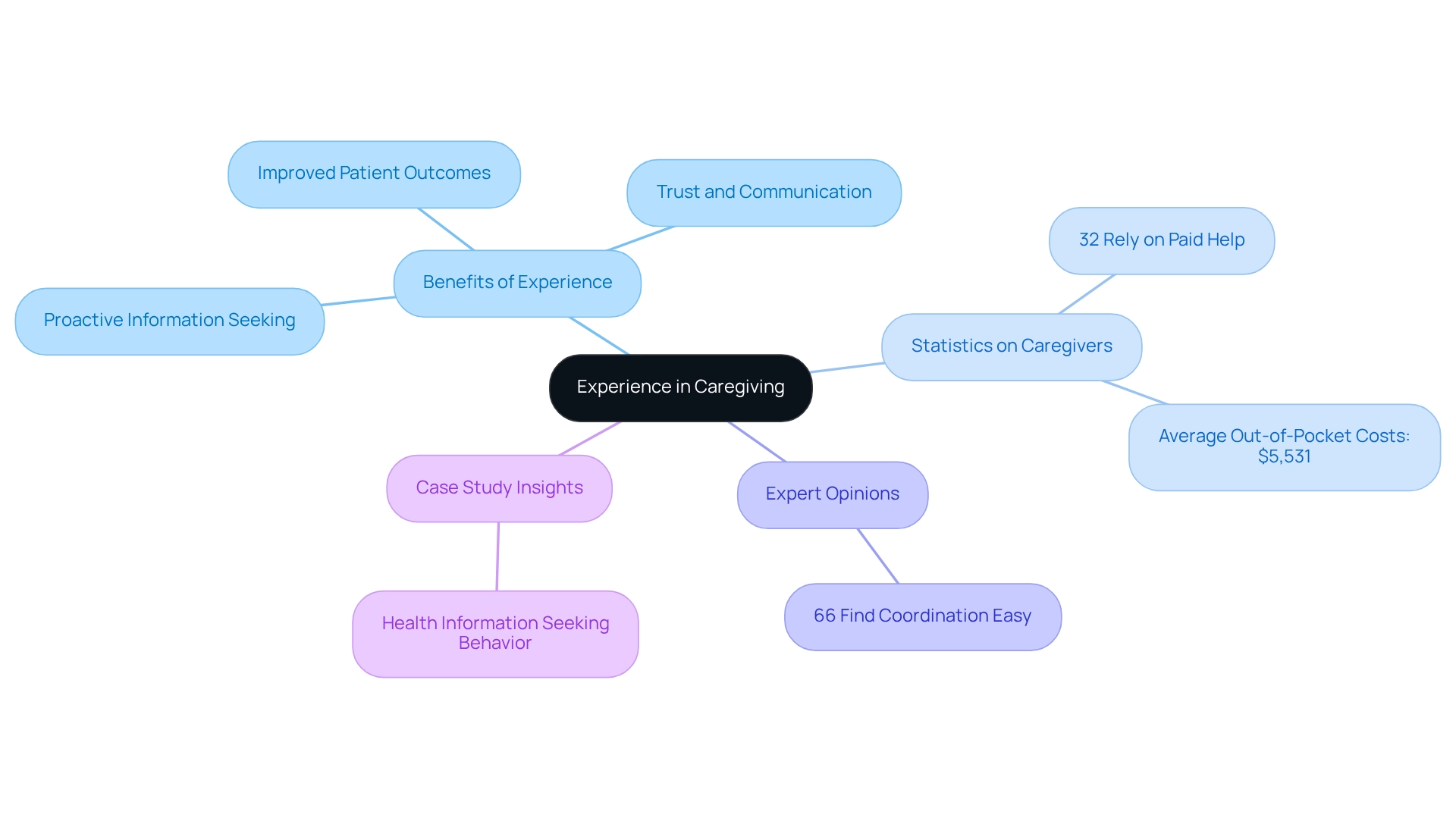
Companionship: Fostering Emotional Connections
Companionship is an essential component of a private duty caregiver’s role, especially for seniors who often face isolation and loneliness. Private duty caregivers, such as CNAs and HHAs, who actively engage in meaningful conversations, participate in shared activities, and provide emotional support can profoundly enhance the well-being of those they assist.
For instance, a private duty caregiver who dedicates time to play games, take walks, or simply listen to their clients’ stories creates a sense of connection that alleviates feelings of loneliness, enriching the caregiving experience and significantly promoting mental and emotional well-being.
Research indicates that one in three older adults report a lack of companionship, which negatively impacts their mental health and overall quality of life. Private duty caregivers can play a crucial role in addressing this statistic by fostering regular interactions that encourage social engagement.
Furthermore, initiatives like the AARP Foundation’s Connect2Affect highlight the importance of social support in combating loneliness, offering resources that help older adults connect with their communities. Private duty caregivers can use these resources to enhance their interactions, ensuring that seniors feel supported and connected.
Additionally, addressing the digital divide is vital; affordable home care services, including those provided by private duty caregivers, CNAs, and HHAs, can help bridge this gap, allowing seniors to access companionship and support more easily.
By fostering these emotional connections and actively seeking ways to engage with their clients, private duty caregivers play a pivotal role in improving the mental health of seniors, ultimately enhancing their overall well-being. Caregivers are encouraged to incorporate simple practices into their daily routines, such as scheduling regular activities or check-ins, to strengthen these vital connections.
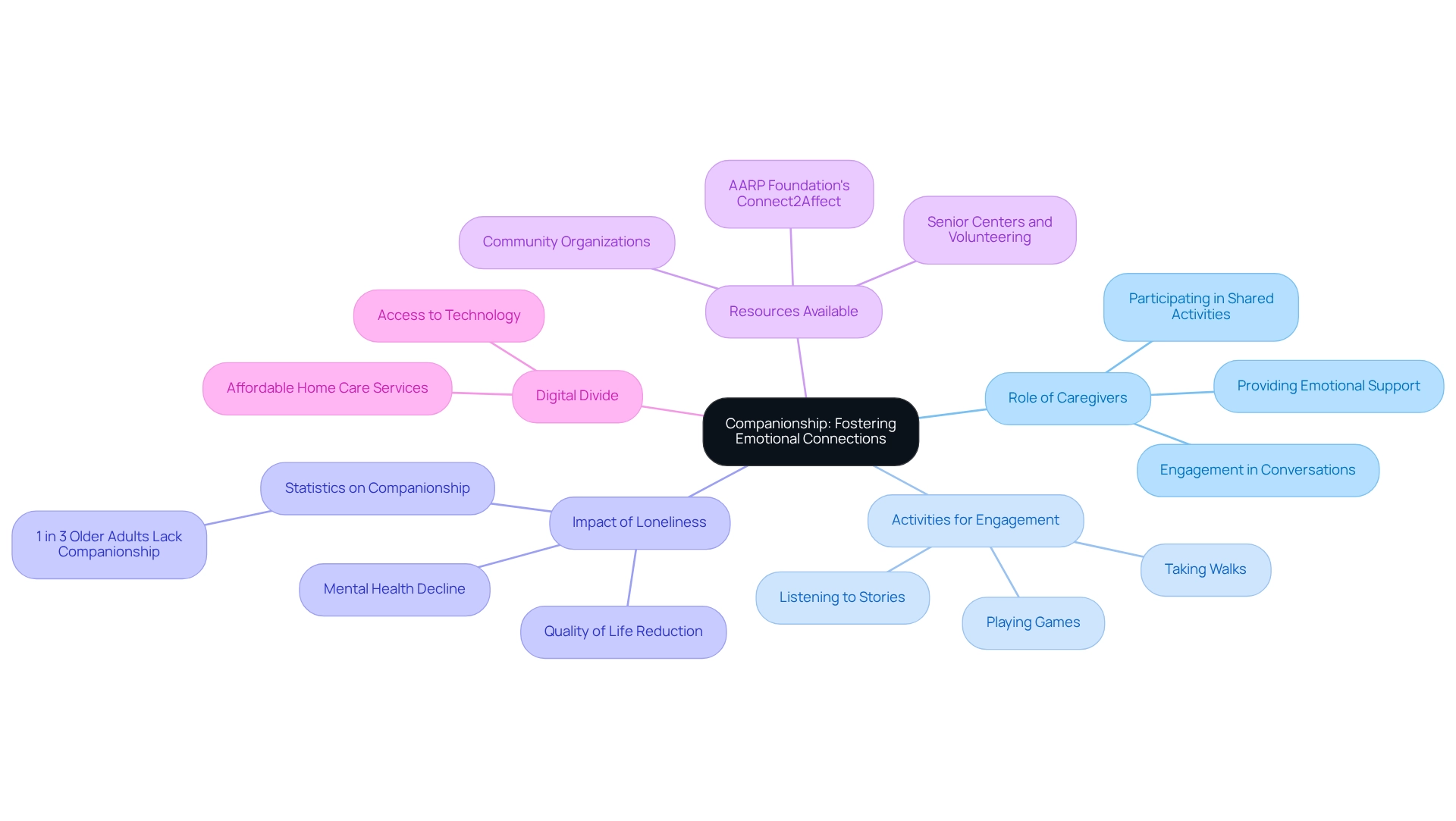
Problem-Solving Skills: Overcoming Care Challenges
Problem-solving abilities are essential for private duty caregivers, who frequently face unexpected challenges that demand quick thinking and adaptability. Effective private duty caregivers assess situations, identify potential solutions, and implement strategies to address issues as they arise. For instance, when a client is hesitant to take medication, a support provider might explore alternative administration methods or engage the client in a conversation to understand their concerns. This proactive approach not only resolves immediate issues but also fosters a nurturing environment, enhancing the overall support experience for a private duty caregiver.
Additionally, the Best Care Concierge Program further supports the private duty caregiver by providing access to a network of professionals, including lawyers, financial advisors, guardians, case managers, social workers, and therapists. This resource proves invaluable when navigating complex support challenges, especially considering that approximately 47% of those providing assistance live on an annual household income of less than $50,000, adding financial stress that complicates their ability to manage responsibilities effectively.
Research shows that those offering support often demonstrate rational problem-solving styles, although some may struggle with avoidant tendencies that can hinder effective assistance. A study on support provider problem-solving styles revealed that while many individuals excel in rational decision-making, there are significant weaknesses in avoidant styles that may necessitate clinical attention. This underscores the importance of ongoing support and education to enhance the problem-solving skills of caregivers.
Experts emphasize that a private duty caregiver providing personalized support greatly increases patient satisfaction, highlighting the crucial role of flexibility and attentiveness to individual needs in caregiving roles. By refining their problem-solving abilities and leveraging resources like the Best Care Concierge Program, private duty caregivers can more effectively navigate unexpected challenges, ensuring that clients feel valued and understood while upholding a high standard of care.
To enhance your problem-solving skills as a private duty caregiver, consider keeping a journal of the challenges you encounter and the solutions you implement. Reflecting on these experiences can help you devise strategies for future situations, ultimately improving your caregiving effectiveness.
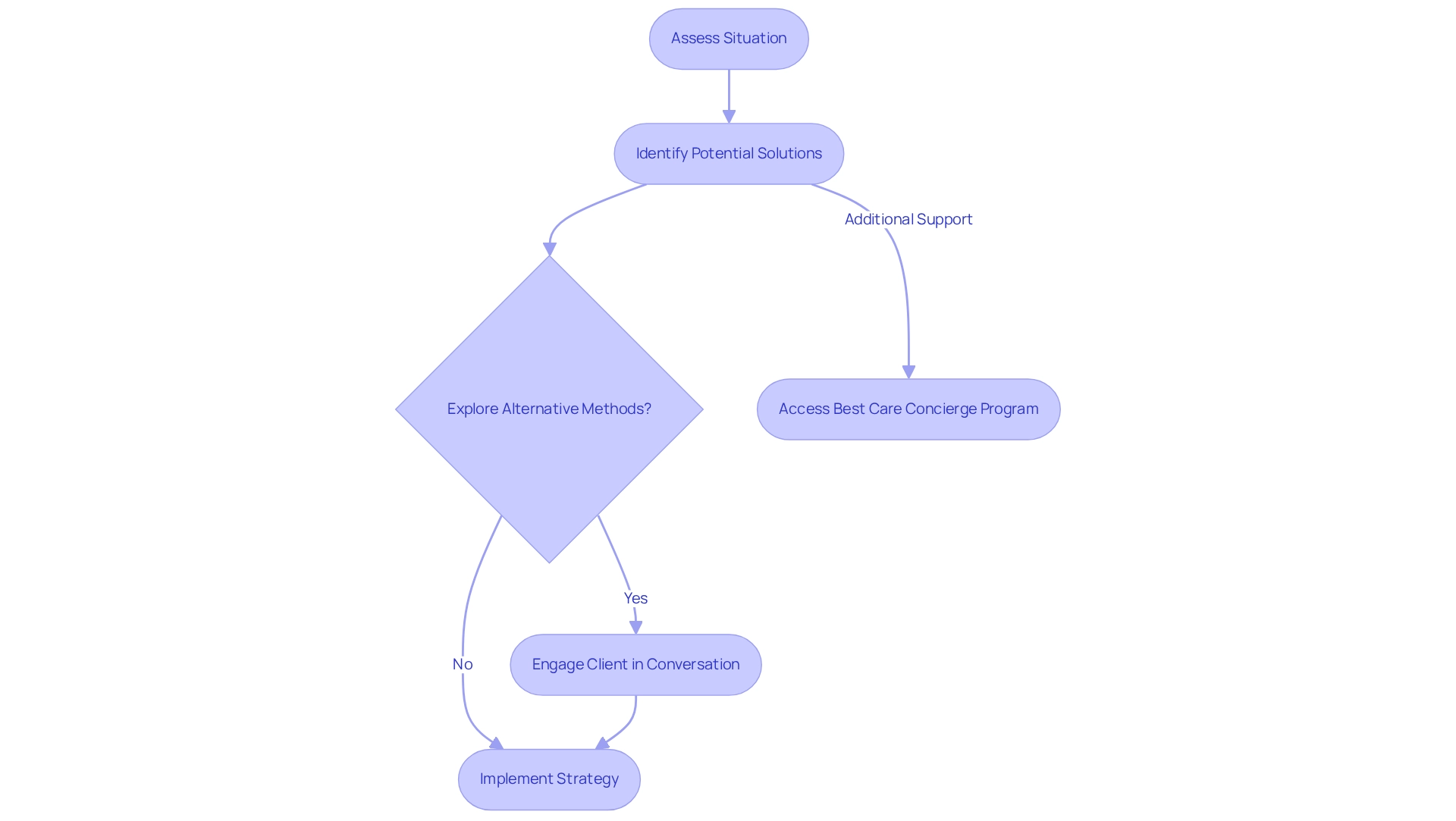
Physical Fitness: Maintaining Energy for Caregiving
Physical fitness is essential for a private duty caregiver, particularly due to the significant physical demands of the role, which often include lifting, assisting with mobility, and managing daily tasks. When providers prioritize their own well-being, they are better equipped to face these challenges and deliver high-quality support. Engaging in regular physical activity not only enhances strength and stamina but also boosts overall wellness, enabling caregivers to fulfill their responsibilities more effectively.
Statistics reveal that the average support provider dedicates 17.4 hours each week to assistance, underscoring the importance of physical endurance. Additionally, caregivers who adopt and model healthy habits can inspire their clients to engage in physical activity, fostering a healthier lifestyle for both parties. This mutual connection highlights the vital role of provider health in enhancing the quality of care, as healthier providers tend to be more effective in their roles, ultimately benefiting those they serve.
As noted in a recent study, a more supportive policy framework could alleviate the burden on caregivers while simultaneously improving the overall quality of care for recipients. Furthermore, promoting physical activity among caregivers can lead to better health outcomes, emphasizing the need for strategies that encourage beneficial forms of physical activity while considering the unique challenges faced by those in caregiving roles.
It’s also crucial to acknowledge that many caregivers encounter financial difficulties, with 47% reporting annual household incomes below $50,000. This reality can significantly impact their ability to prioritize personal health and fitness. We’re here for you, and recognizing these challenges is the first step towards creating a supportive environment that fosters both caregiver and client well-being.
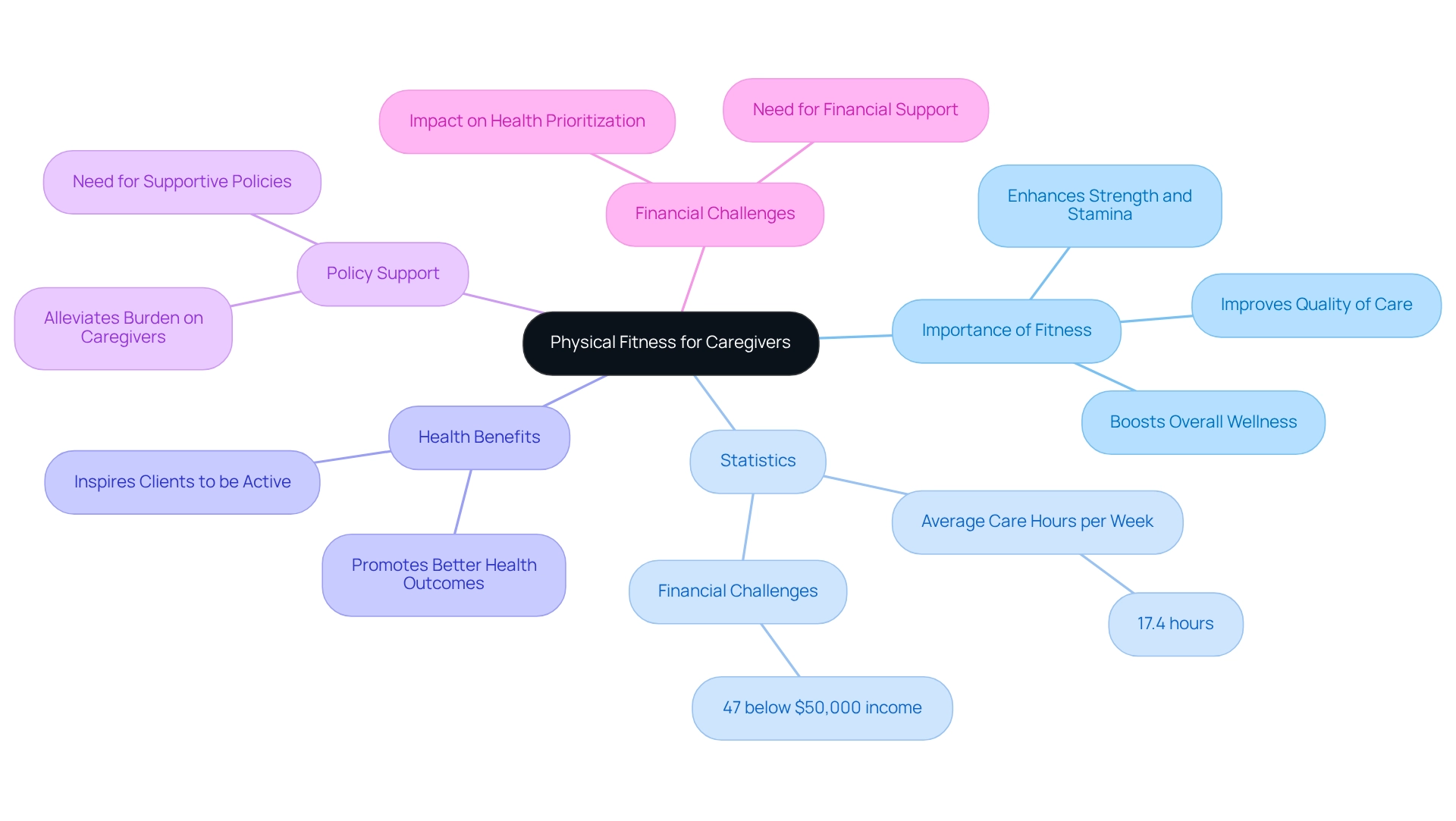
Conclusion
Compassion serves as the cornerstone of effective private duty caregiving, profoundly impacting the quality of care provided to clients. The essential qualities of:
- Reliability
- Effective communication
- Adaptability
- Patience
- Professionalism
- Experience
- Companionship
- Problem-solving skills
- Physical fitness
work together to create a nurturing environment for both caregivers and the seniors they serve. Each quality not only enhances the emotional and physical well-being of clients but also uplifts caregivers, ensuring a more fulfilling caregiving experience.
By prioritizing compassion alongside these critical qualities, caregivers can significantly improve health outcomes for seniors, fostering deeper emotional connections that alleviate feelings of loneliness and anxiety. The importance of these attributes cannot be overstated; they contribute to a holistic approach to caregiving that addresses both the practical and emotional needs of clients. Ultimately, a commitment to these qualities leads to a more compassionate, effective, and rewarding caregiving experience, benefiting everyone involved.
As the caregiving landscape continues to evolve, recognizing and nurturing these qualities will pave the way for improved care standards and more supportive environments for caregivers. Emphasizing compassion and the essential skills outlined is not just beneficial; it is vital for creating a future where quality care is the norm, ensuring that seniors receive the dignity and respect they deserve.
Frequently Asked Questions
What role does compassion play in caregiving?
Compassion is essential in caregiving as it allows caregivers to understand and empathize with the emotions and needs of individuals, enhancing their emotional well-being and leading to improved health outcomes.
How does Best Care Nurses Registry ensure compassionate support for clients?
Best Care Nurses Registry follows a three-step process: 1) Reach out to their staff to discuss needs; 2) Have a conversation about the situation and obtain a care plan from a doctor; 3) Connect with a private duty caregiver who offers compassionate support tailored to the client’s needs.
What impact does emotional connection have on seniors receiving care?
An emotional connection between caregivers and seniors can significantly alleviate feelings of loneliness and anxiety, nurturing a sense of value and understanding, which leads to better emotional well-being and improved physical health outcomes.
Why is reliability important in caregiving?
Reliability is crucial as it establishes trust between caregivers and clients. Consistent and punctual caregivers create a routine that seniors can depend on, enhancing their sense of security and overall well-being.
What are the consequences of unreliable caregiving for seniors?
Seniors without reliable caregiving may face health declines, poor nutrition, hygiene issues, and increased social isolation, highlighting the need for dependable assistance.
How does effective communication contribute to caregiving?
Effective communication, which includes verbal exchanges, active listening, and non-verbal cues, ensures that caregivers can clearly express assistance plans and empower clients to take charge of their health, ultimately promoting independence.
What is the significance of emotional support for families of clients?
Emotional support is vital for families as it provides reassurance that their loved ones are safe and happy at home, allowing families to feel more at ease.
What is the typical age of private duty caregivers, and how does this affect their experience?
The typical age of private duty caregivers is around 50 years, often bringing a wealth of experience that enhances the quality of care they provide.
How does Best Care Nurses Registry address communication needs in caregiving?
Best Care Nurses Registry prioritizes effective communication by ensuring caregivers are skilled in active listening and empathy, which helps tailor support to meet the specific needs of clients.
What should families do to explore personalized assistance solutions?
Families can call Best Care Nurses Registry at (888) 203-2529 to discuss their needs and explore personalized assistance solutions.



